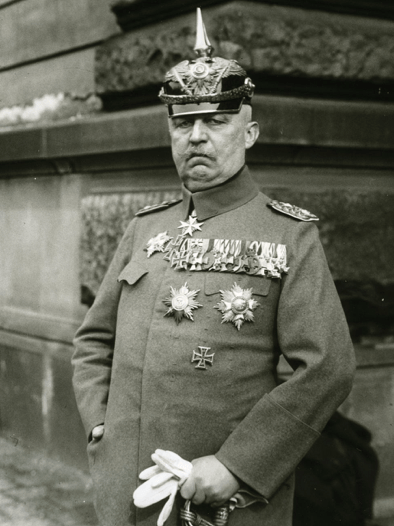Tak to bylo dobrý hovado. Jiný výraz pro takového člověka bohužel není.
9 April 1865 General Erich Ludendorff is born
Categories: Personalities , First World War , Calendar
 He considered the Freemasons to be the architects of Germany's defeat in the First World War, and even sympathised with the NSDAP. General Erich Ludendorff was unable to acknowledge his share of the blame, which was evident in his war memoirs. He was born on 9 April 1865.
He considered the Freemasons to be the architects of Germany's defeat in the First World War, and even sympathised with the NSDAP. General Erich Ludendorff was unable to acknowledge his share of the blame, which was evident in his war memoirs. He was born on 9 April 1865.
Ludendorff, along with Paul von Hindenburg, is considered the main architect of German tactics during World War I. He became famous for his victory at the Battle of Tannenberg. He advocated so-called total war. That is, the deployment of all the human and economic resources of the country. No distinction is made between combatants and civilians, as both can be considered part of the war effort. In Nazi Germany, total war involved total deployment.
As early as August 8, 1918, after the so-called "Black Day of the German Army," Ludendorff warned that Germany could not win and should sue for peace. In particular, however, the proposals for terms of cessation of hostilities from France did not appeal to Ludendorff or Hindenburg. "Germany and France exchanged several peace notes. Ludendorff, however, regarded them all as requests for unconditional surrender and urged his army to persevere to the end. The Emperor and others, however, thought that in this ostentatious boldness he was going too far, and that Germany might find herself on the verge of ruin. Ludendorff resigned on 26 October," writes Andy Wiest in his book, A Pictorial History of the First World War.
Ludendorff could not accept how the war and the later peace agreements turned out. In 1919, he completed his war memoirs. "They became the basis of the myth of the stab-in-the-back dagger, which was crucial to Nazism's subsequent successes. Ludendorff, unable to admit his own guilt, identified the Social Democrats, Socialists and Freemasons as the architects of defeat on the home front. Without this dagger in its back, Germany would have won the war," writes Anders Rydell in his book The Book Thieves.
Ludendorff did not emerge from the mire of conspiracy theories even after writing his memoirs. Gradually, he became close to the far-right in Munich and the NSDAP. "During the 1923 Beer Putsch, where the Nazis attempted to seize power, he marched alongside Hitler to overthrow the government. And unlike him, he managed to avoid prison. During the 1920s, Ludendorff came to regard the Freemasons as the masterminds of a worldwide conspiracy and, along with his wife Mathilde, became convinced that members of the organization possessed supernatural powers. The couple even wrote a book in 1927 entitled The Elimination of Freemasonry by Revealing Its Secrets," Rydell adds.
The Ludendorffs were also convinced that the Masons, through their international network of contacts during World War I, had divulged military secrets to their enemies. Among other things, Ludendorff developed the thesis that the Masonic Order was controlled by Great Britain. He also held widely anti-Christian and anti-Jewish views, which he publicly proclaimed. He did not live to see the Second World War, dying on 20 December 1937 at the age of 72. He had liver cancer.
Sources: The Book Thieves, Andy Wiest: A Pictorial History of World War I, www.dhm.de
The article is included in categories:




